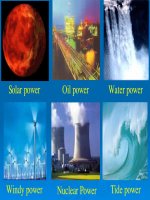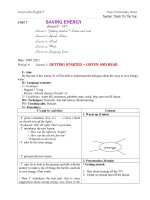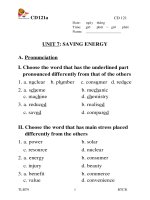Unit 7 Saving energy
Bạn đang xem bản rút gọn của tài liệu. Xem và tải ngay bản đầy đủ của tài liệu tại đây (158.75 KB, 14 trang )
<span class='text_page_counter'>(1)</span>Date of planning: Date of teaching:. Period 42 Unit 7 Saving energy lesson 1: getting started listen and read. A / Aims and Objectives: By the end of the lesson , Ss will be able to use the words and phrases relating to energy saving and understand the dialogue , the ways to save energy. B / Teaching aids: Textbook , cassette , boards , pictures , posters C / Procedure: A. Class organization - Greeting - Check the attendance : B. New lesson 7 min. I / Warm up: Brainstorming - Ask Ss to look at picture (Getting started) - Have them work in pairs and make a list of things the family could do to save energy. - Call on some Ss to read the list aloud. * Suggested answers: - Save water by turning off the faucet when there is enough water supply. - Turn off the lights when unnecessary. - Turn off TV and radio when nobody watches or listens. 15 min II / Pre reading: Introduce the topic of the passage reading and some new words to Ss. 1.Pre- teach vocabulary: - Water bill (n): statement of charges for water used. - Enormous (a) = big / huge - Crack (v) = break without complete separation of parts / fissure - Pipe (n): tube of metal for conveying water. - Plumber (n): a person who installs and repairs pipes and plumbing - Dripping faucet (n): the tap with falling drop of water. * Checking vocabulary: Matching New words Meaning. Work in pairs. Listen and copy. Listen and repeat chorally , individually Copy down. Work in groups.. 1. Water bill a. Thî söa èng níc - Read their answers.
<span class='text_page_counter'>(2)</span> 2. Enormous b. Hoá đơn tiền nớc 3. Crack c. Vßi níc bÞ nhá rät. aloud. Copy down. Listen and answer the questions. 4. Pipe d. To , lín 5. Plumber e. èng nín. Work in pairs. 6. Dripping faucet f. VÕt nøt, g·y. Practice in class.. - Ask Ss to match the words in A with the meanings in B. - Give feedback: 1-b 2-d 3-f 4-e 5-a 6-c => Ask “ Does Mrs Mi advise Mrs Ha to take showers ? “ -> what does she say ? Model: I suggest taking showers. + Word cue – drill: Making sentences with suggest + Ving 1. turn off / lights / before / leave / room 2. get a plumber / make sure there / no cracks in the pipes. 3. repair dripping faucets. 4. take / showers / instead / have / baths. - Call on Ss to read their sentences aloud. 13 min III / While - reading * Set the scene “ Mrs Mi is talking to her neighbor , Mrs Ha about the water bill this month - Ask Ss to practice the dialogue with a partner. - Call some pairs to practice in front of class , feedback on Ss, pronunciation and intonation ,then correct the mistakes if any. - Have Ss read the dialogue and decide the statements in the book True or False. Correct the false ones. - Get them to compare the answers with a friend - Call on some Ss to read their answers in class and explain their choice. - Give the correct answers: 1.True 2. True 3. False -> Mrs Ha has not checked the pipes.. Listen carefully. Practice the dialogue (pair work) Read the dialogue again and do the exercise. Read their answers aloud and correct the false ones.. Copy down.. Work in pairs. Practice the dialogue in class. Listen and copy..
<span class='text_page_counter'>(3)</span> 4. False -> Mrs Ha suggests taking showers. 5. True - Have them copy. 7 min. IV / Post – reading: Mapped dialogue - Write some words in the dialogue on the board. Matter Worried……... water bill ……... Reduce…… Plumber …….. cracks …………… - Ask Ss to close the book and recall the dialogue base on the words given. - Call on some pairs to practice the conversation in class.. 3 min. V / Homework: 1. Summarize main point and copy in their notebooks 2. Do the exercises (1,2) in the workbook. * Feedback:. Date of planning: Date of teaching:. Period 43 Unit 7 Saving energy lesson 2: Speak. A / Aims and Objectives: By the end of the lesson , Ss will be able to use suggestions to suggest ways to save energy through group discussion. B / Teaching aids: Textbook , Posters , pictures and boards … C / Procedure: A. Class organization - Greeting.
<span class='text_page_counter'>(4)</span> - Check the attendance : B. New lesson. 7 min. I / Warm up: Revision Expressions of making and responding to suggestions Lead in the new lesson.. 10 min II / Pre – speaking: Introduce the topic of the speaking: 1. Review the ways to make suggestions Suggestion Response I suggest + V- ing I think we should Shall we ? Why do not we ? How about + V- ing ? What about + V- ing ? Let,s Ok That is a good idea. All right no. I do not want to. I prefer to Let,s. Work in groups. Work individually. Work in groups. Practice in class - Ask Ss to make some sentences with the structures above. 2. Description: - Have Ss look at the pictures (A – H) and describe the pictures in class. - Call on Ss to practice in class. A. The faucet is on but nobody uses it. B. Too much gas is use. C. The fan is on , but nobody is in the room. D. The air conditioner is on , but nobody is in he room. E. The lights are on , but nobody is in the room. F. The bath is overflowing. G. They should not go to work by motorbike. H. They should go by bus. 18 min III / While - speaking: 1. Picture cue drill Speak a) - Have Ss look at expressions in the above tables and pictures in the book to make suggestions about how to save energy. + Example:. Work in groups of 4 students.
<span class='text_page_counter'>(5)</span> 5 min. 2 min. A: I think we should turn off the faucet. I suggest fixing the faucet. - Call on some Ss to read the suggestions aloud. - Feedback and give suggested Answers: B. I suggest turning down the gas. C. I suggest turning off the fan. D. I think we should turn off the air conditioner when no one is in. E. Why do not we turn off the TV when no one watches it. F. I think we should turn off the faucets. G. I think we should not go to school by motorbike. H. I suggest going to school by bus. 2. Speak b): work out an Action Plan to save energy for your class. - Ask Ss to work in groups of 4 Ss , using the suggestions in Speak a) - Go around class and provide help if necessary. Example: S1: I think we should turn off all the lights before leaving the class. S2: That is a good idea S 3: What about going to school by bus ? S 4: Great ! Let,s take the bus to school every day. - Call on some groups to act out the discussion - Give feedback IV / Post - speaking: Write - Ask Ss to write some sentences about saving energy in their houses. Example: - I think we should turn off the TV set when we do not watch it. - Why do not we go to school by bus. V / Homework: 1. Copy the completed sentences in their notebooks. 2. Let Ss do the exercises (3,4) in their workbook.. Date of planning: Date of teaching:. Read their suggestions aloud.. Work in groups. Practice in front of class. Work individually. Listen and copy.. Period 44 Unit 7 Saving energy lesson 3: Listen. A / Aims and Objectives: By the end of the lesson , Ss will be able to understand and know how to do 2 common listening tasks: True or False and Gap filling , Get general knowledge about one kind of alternative energy: solar energy. B / Teaching aids: Textbook , cassette , boards … C / Procedure:.
<span class='text_page_counter'>(6)</span> A. Class organization B. New lesson. 5 min. 10 min. 20 min. I / Warm up: Chatting 1. Is the sun important to our life ? 2. In what way is it important to us ? 3. Can it provide us with energy ? 4. Do you know how we can receive its energy ? 5. Do you know anything about solar energy ? -> Lead in the new lesson. II / Pre- listening: Introduce the topic of the listening and some new words to students. 1. Pre – teach vocabulary: - Solar (a): belongs to the sun. - Solar energy (n): energy like electricity received from the sun. - Nuclear power (n): power derived from nuclear energy. - Solar panel (n): device like walls or doors for receiving solar radiation - Advanced (a): ahead of time / high level - Roof (n): upper covering of a house - Effective (a) - > effectively (adv). Work in the whole class.. Listen and copy.. Listen and repeat chorally , individually. Guess its meaning and copy.. Play game Work in group. Work individually.. Copy down. Work in group Read their predictions Listen to check their.
<span class='text_page_counter'>(7)</span> 7 min. 3 min. * Checking vocabulary: Rub out remember 2. True false statements predictions - Let Ss read the statements in a) carefully and give their predictions , then write them on the board. III / While listening: 1. Prediction check: - Play the tape two times and ask Ss to check their predictions. - Ask them to compare the answers with a friends. - Feedback and give the correct answers: 1. True 2. False -> Most of our electricity comes from the use of coal , gas , oil or nuclear power) 2. False -> It is enough to provide power for total population) 4. True 5. False -> in 2015 - Have them copy down 2. Gap filling: - Ask Ss to read the statements carefully and guess the missing words. - Call on some Ss to read their predictions aloud. predictions. Read the completed sentences aloud. Copy.. Work in group of 4 Ss. Demonstrate in front of class.. Listen and copy..
<span class='text_page_counter'>(8)</span> and write on the board . - Ask them to listen to the tape to fill in each blank with one word to check their predictions. - Call on some Ss to read the completed sentences aloud. - Feedback: 1. effective 2. pollution 3. countries 4. store 5. roof 6. instead - Have them copy and read them again. IV / Post listening: Discussion - Have Ss work in group of 4 Ss to discuss these questions: 1. What kind of energy can be used today ? 2. What are the benefits of solar energy ? 3. How can people get solar energy ? - Call on some volunteers from each group to demonstrate in front of class. - Correct and give suggested answers 1. Coal , gas , oil , nuclear power and solar energy can be used today. 2. Solar energy is cheap , clean , effective and it does.
<span class='text_page_counter'>(9)</span> Date of planning: Date of teaching:. not cause pollution or waste natural resources. 3. Solar panels are installed on the roof of a house to receive the solar energy from the sun. V / Homework: 1. Write a short passage (40-50 words) about their knowledge, s solar energy. 2. Do the exercises (4,5) in the work books. Period 45 Unit 7 Saving energy lesson 4: Read. A / Aims and Objectives: By the end of the lesson , Ss will be able to get general idea for the reading through choosing the best summary and answering questions and know how to save energy. B / Teaching aids: Textbook , cassette , board C / Procedure: A. Class organization - Greeting - Check the attendance : B. New lesson 10 min I / Warm up:. Brainstorming. The benefits of using solar energy. Suggested answers: - cheap and clean - provides enough power for the world population - does not cause pollution - can be stored for a number of days. - can be received by the solar panels installed on the roof of a house.. Work in group.
<span class='text_page_counter'>(10)</span> - can be used on cloudy days. - help save money as well as natural resources. => lead in the new lesson. 10 min II / Pre- reading: Introduce the topic of the passage reading and some new words to Students. 1. Pre- teach vocabulary: - Luxury >< Necessity (n) - Consumer (n): user of product or service - Household (n): family. - Account for (v): represent - Labeling scheme (n): campaign that gives labels to products. - Tumble dryer (n): machine that dries things usually hair or clothes. - Innovation (n): bringing in new ideas , making changes. - to conserve -> conservation (n) - category (n) (translation) * Checking vocabulary: What and where 15 min III / While - reading: 1. Scanning and skimming - Ask Ss to read the passage very quickly and answer the following questions: 1. What continents are mentioned in the text ? 2. Are electricity , gas and water luxuries or necessities ? - Call on some Ss to answer the questions. - Give feedback: 1. America and Europe 2. They are necessities 2. Choosing the best summary: + Which of the following is the best summary of the passage ? - Have Ss read the passage more carefully and choose the best summary for it among four following options (In the text book) - Ask them to work in groups to find out the best answer - Call on some Ss to give explanation for their choice => North American and European countries are interested in saving money and natural resources. (It is the best answer because three others are too specific. They only cover part of the passage) 3. Answering questions: - Have Ss read the passage again and answer the. Write their ideas on the board. Listen and copy.. Repeat chorally , individually and guess its meaning , then copy down.. Play games. Read the passage quickly and answer the questions. Practice in pairs. Work in groups - Demonstrate in.
<span class='text_page_counter'>(11)</span> questions. - Ask them to compare with a friend. - call on some Ss to read their answers aloud in front of class. - Give feedback: 1. They are interested in products that will not only work effectively but also save money. 2. To spend less on lighting we replace an ordinary 100 watt light bulbs by using saving bulbs. 3. She will pay US $ 2 4. The purpose of the labeling scheme is to tell the consumer how energy efficient each model is , compared with other appliances in the same category. - Have them copy. 7 min. 3 min. IV / Post - reading: Discussion - Have Ss work in group of 4 Ss to find out the answers. 1. What should we save energy ? 2. What should we do to save money and natural resources ? - Call on the representative from each group to present in front of class. - Give feedback: 1. Because we want to save money and natural resources. 2. - Use solar energy instead of coal , gas and oil. - Use energy – saving house hold appliances like bulbs , refrigerators , stoves , cookers … - Reduce the amount of water and electricity we use. - Turn off the faucets , the TV or radio when we do not use them. V / Homework: 1. Summarize main points. 2. Let Ss do the exercises (5 ,6) in the workbook 3. Prepare the next lesson.. front o class.. Work in pairs. Copy down.. Work in group Present their ideas in front of class.. Listen and copy..
<span class='text_page_counter'>(12)</span> Date of planning: Date of teaching:. Period 46 Unit 7 Saving energy lesson 5: Write. A / Aims and Objectives: By the end of the lesson , Ss will be able to write short , simple speech with clear organization and present it in front of the whole class. B / Teaching aids: Textbook , boards , chalks C / Procedure: A. Class organization - Greeting - Check the attendance : B. New lesson 7 min. I / Warm up:. Nought and crosses Electricity Freezer Consumer. Play game (Whole class). Gas. Listen and copy. Household. Listen and write down.. Washing machine Water Dryer Innovation Work in pairs Lead in the new lesson. II / Presentation: Introduce the topic of the writing 10 min and some definitions of speech. 1. Definition of a speech: It is the act of delivering a formal spoken communication to an audience. A speech usually had three parts: Introduction , Body and conclusion - Ask Ss some questions about the functions of each part.. Practice speaking asking and answering the questions in front of class..
<span class='text_page_counter'>(13)</span> a. What do you do in the Introduction of a speech ? b. What do you do in the body of a speech ? c. What do you do in the conclusion of a speech ? - Call on some Ss to answer the questions. - Give feedback: a. Get people,s attention and tell them what we are going to talk about. b. Give details in easy to understand language. c. Sum up what we have said. 2. Matching: - Ask Ss to work individually , match each part of speech in column A to a suitable function in column B A B 1. Introduction 2. Body 3. Conclusion A. summing up what you have said B. getting people,s attention and telling them what you are going to talk about. C. Giving details in easy – to – understand language. - Give correct answers: 1- B 2- C 3- A 25 min III / While - writing: 1. Ordering: - Ask Ss to work in pair , put the sections in the correct place to complete a speech. - Call on some Ss to deliver the speech in front of class. - Comment and correct and necessary mistakes. - Give the correct answers: 3-2 -1 - Ask Ss some questions: a. What does Professor Roberts do in the introduction of his speech ? What is he going to talk about ? b. What are his ideas about saving the amount of gas ? c. What does he say finally ? - Call on some pairs to practice in front of class. 2. Discussion: - Ask Ss to read carefully the aims of the exercise. - Have them work in pairs to answer the questions below. a. What do you think about the amount o garbage nowadays ? b. Why do we have to reduce garbage ? c. How can you help with reducing garbage ? = > Suggested answers:. Work individually.. Work in pairs. Practice asking and answering the questions.. Work in pairs. Work in groups.
<span class='text_page_counter'>(14)</span> 7 min. 3 min. a. Every household produces a lot of garbage. b. Pollute the environment / affect people ,s health c. Collect plastic bags , empty cans and bottles send them to factories for recycling / use cloth bags / not keep solid waste with food waste / use food waste to feed pigs , chickens and other animals. 3. Writing: - Have Ss work in group of 4 to write “ Reducing the Demonstrate in front amount of garbage “ of class. - Monitor and provide help if any. - Call on some representative of each group to present their writings. Suggested writing: Good morning ladies and gentlemen. I am a conservationist and today I am going to tell you how to reduce the amount of garbage. You know, nowadays , every household produces a lot of garbage. This not only pollutes the environment but effects people, health as well. So it is necessary for you to reduce the amount of garbage you produce. You can reduce this amount by: - Collecting plastic bags , empty cans and bottles then send them to factories for recycling. - Using cloth bags instead of plastic bags. - Not keep solid waste with food waste. - Using food waste to feed pigs , chickens and other animals. If you follow these simple rules , not only will reduce the amount of garbage you produce but your life will be safer Work in groups IV / Post - writing: Discussion Present their ideas in Why should we save energy ? front of class. - Ask Ss to work in group to list the reasons for saving energy. - Call on some representative of some groups to present in front of class. Suggested answers: Save money / conserve the Earth, s resources / protect environment / prevent natural disasters. Listen and copy. V / Homework: 1. Copy down the completed writing in their notebooks. 2. Prepare the next lesson. ww.
<span class='text_page_counter'>(15)</span>









